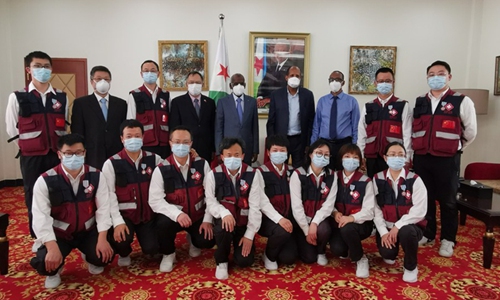Technology empowers Africa’s COVID-19 fight
By Laetitia Tran Ngoc Source:Global Times Published: 2020/6/20 16:49:42

Djiboutian Prime Minister Abdoulkader Kamil Mohamed (5th left, back row) and other officials pose for a group photo with members of the Chinese medical team in Djibouti, capital of Djibouti, May 10, 2020. Photo: Xinhua
On June 17, Chinese and African leaders convened an Extraordinary China-Africa Summit on Solidarity Against COVID-19. The conference aimed at strengthening international cooperation and aid to African countries, taking stock of what had been accomplished so far and outlining a way forward for further collaboration.
When the pandemic has been further spreading throughout the world, many feared that Africa would be hit extremely hard given the continent's vulnerable and weak medical systems. More than two months later, Africa is one of the least affected regions of the world, accounting for only about 5 percent of global cases and less than 1 percent of all deaths.
However, if Africa manages to avoid a catastrophic health crisis, the long term impact of COVID-19 is yet to be seen, as the pandemic has unearthed and worsened preexisting inequalities within African societies. Implementing these preventive measures came at great economic risk on a continent where more than 80 percent of the population work in the informal sector, often living on daily earnings. Women, who account for 74 percent of the informal sector, were particularly vulnerable. Due to the COVID-19 pandemic, over 250 million primary and secondary children are also now out of school in Africa, a situation that has deepened the divide between the poor and the lucky few able to continue their studies online.
The pandemic was also a cruel reminder of the inadequacy of most African health systems and provision of basic service, such as water. How can we expect African citizens to frequently wash their hands when millions of them lack access to clean water?
It is worth noting that China's strategic support is geared at addressing these challenges. President Xi's keynote speech, which emphasized China's support for Africa to achieve sustainable development over the long run, strengthen industrial and supply chains and explore broader cooperation with Africa in new business forms such as the digital economy, clean energy, and 5G, shows that China understands not only Africa's most urgent challenges but also its long-term needs and potential.
This perspective is along the same line as the initiatives African leaders have taken in recent years to achieve Agenda 2063, the continental framework for inclusive growth and sustainable development in Africa - objectives made more urgent than ever now that the COVID-19 health crisis has exposed and intensified structural problems on the continent. All this will require African countries to become much less reliant on aid, improve education, build resilient health systems and add value to what Africa is producing.
China stands out from Africa's other partners because of its demonstrated experience in poverty reduction. New technologies have empowered China's anti-poverty drive, and since last year authorities have intensified efforts in internet-empowered poverty reduction by expanding IT infrastructure. Residents of poor and remote areas are now able to make a living by selling their products from online platforms like Alibaba.
Africans have demonstrated their ingenuity since the start of the crisis. In Kenya, telecommunications firm Safaricom implemented a fee-waiver on its M-Pesa product to encourage the use of mobile money. In Kigali, moto-taxis will accept payment using mobile money from July 1.
Women market sellers in Uganda are using the mobile application Market Garden to sell their goods without leaving their homes. As Africa faced a critical shortage of respirators, a team from Honoris United Universities, the first private pan-African higher education network, has designed a ventilator which can be quickly manufactured via 3D printing for less than $200.
In Africa, as in China, access to the internet allows poorer populations to save, invest and borrow money, get an education, have access to basic healthcare and be able to trade with bigger markets - all this by driving efficiency and reducing the need for physical human contact. China's targeted support and expertise could amplify the fruits of Africa's creativity.
The pandemic has disrupted business as usual all over the world. In Africa, this wake-up call also offers the opportunity to fast-track the continent's ambitious development agenda. China's debt relief measures, such as the suspension of debt repayments, and medical support, as precious as they are, are short-term solutions that should be complemented by long-term initiatives by African governments.
The author is a researcher based in Brussels. opinion@globaltimes.com.cn
Posted in: VIEWPOINT